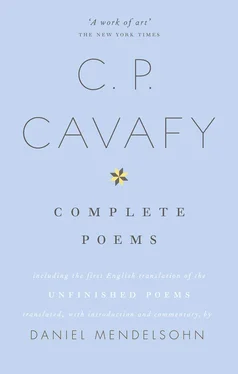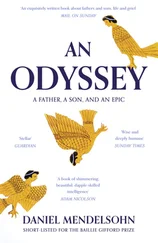nor will you feel superior—superior how?—
when, in Alexandria, Theodotus brings you,
upon a charger that’s been stained with blood,
poor wretched Pompey’s head.
And do not take it for granted that in your life,
restricted, regimented, and mundane,
such spectacular and terrifying things don’t exist.
Maybe at this very moment, into some neighbor’s
nicely tidied house there comes—
invisible, immaterial—Theodotus,
bringing one such terrifying head.
[< 1911 ; 1915]
On one monotone day one more
monotone, indistinct day follows. The same
things will happen, then again recur—
identical moments find us, then go their way.
One month passes bringing one month more.
What comes next is easy enough to know:
the boredom from the day before.
And tomorrow’s got to where it seems like no tomorrow.
[ 1898 ; 1908]
As you set out on the way to Ithaca
hope that the road is a long one,
filled with adventures, filled with discoveries.
The Laestrygonians and the Cyclopes,
Poseidon in his anger: do not fear them,
you won’t find such things on your way
so long as your thoughts remain lofty, and a choice
emotion touches your spirit and your body.
The Laestrygonians and the Cyclopes,
savage Poseidon; you won’t encounter them
unless you stow them away inside your soul,
unless your soul sets them up before you.
Hope that the road is a long one.
Many may the summer mornings be
when—with what pleasure, with what joy—
you first put in to harbors new to your eyes;
may you stop at Phoenician trading posts
and there acquire the finest wares:
mother-of-pearl and coral, amber and ebony,
and heady perfumes of every kind:
as many heady perfumes as you can.
Many Egyptian cities may you visit
that you may learn, and go on learning, from their sages.
Always in your mind keep Ithaca.
To arrive there is your destiny.
But do not hurry your trip in any way.
Better that it last for many years;
that you drop anchor at the island an old man,
rich with all you’ve gotten on the way,
not expecting Ithaca to make you rich.
Ithaca gave you the beautiful journey;
without her you wouldn’t have set upon the road.
But now she has nothing left to give you.
And if you find her poor, Ithaca didn’t deceive you.
As wise as you will have become, with so much experience,
you will understand, by then, these Ithacas; what they mean.
[ 1910 ; 1911]
And even if you cannot make your life the way you want it,
this much, at least, try to do
as much as you can: don’t cheapen it
with too much intercourse with society,
with too much movement and conversation.
Don’t cheapen it by taking it about,
making the rounds with it, exposing it
to the everyday inanity
of relations and connections,
so it becomes like a stranger, burdensome.
[ 1905 ; 1913]
Our efforts, those of the ill-fortuned;
our efforts are the efforts of the Trojans.
We will make a bit of progress; we will start
to pick ourselves up a bit; and we’ll begin
to be intrepid, and to have some hope.
But something always comes up, and stops us cold.
In the trench in front of us Achilles
emerges, and affrights us with his shouting.—
Our efforts are the efforts of the Trojans.
We imagine that with resolve and daring
we will reverse the animosity of fortune,
and so we take our stand outside, to fight.
But whenever the crucial moment comes,
our boldness and our daring disappear;
our spirit is shattered, comes unstrung;
and we scramble all around the walls
seeking in our flight to save ourselves.
And yet our fall is certain. Up above,
on the walls, already the lament has begun.
They mourn the memory, the sensibility, of our days.
Bitterly Priam and Hecuba mourn for us.
[ 1900 ; 1905]
Not like a king, but like an actor, he exchanged his showy robe of state for a dark cloak, and in secret stole away.
—PLUTARCH, Life of Demetrius
When the Macedonians deserted him,
and made it clear that it was Pyrrhus they preferred
King Demetrius (who had a noble
soul) did not—so they said—
behave at all like a king. He went
and cast off his golden clothes,
and flung off his shoes
of richest purple. In simple clothes
he dressed himself quickly and left:
doing just as an actor does
who, when the performance is over,
changes his attire and departs.
[ 1900 ; 1906]
The Glory of the Ptolemies
I’m the Lagid, a king. The possessor absolute
(with my power and my riches) of pleasure.
There’s no Macedonian, no Eastern foreigner
who’s my equal, who even comes close. What
a joke, that Seleucid with his vulgar luxe.
But if there’s something more you seek, then simply look:
the City is our teacher, the acme of what is Greek,
of every discipline, of every art the peak.
[ 1896 ; 1911 ; 1911]
Damon the artisan (none as fine
as he in the Peloponnese) is
fashioning the Retinue of Dionysus
in Parian marble. The god in his divine
glory leads, with vigor in his stride.
Intemperance behind. Beside
Intemperance, Intoxication pours the Satyrs wine
from an amphora that they’ve garlanded with vines.
Near them delicate Sweetwine, his eyes
half-closed, mesmerizes.
And further down there come the singers,
Song and Melody, and Festival
who never allows the hallowed processional
torch that he holds to go out. Then, most modest, Ritual.—
That’s what Damon is making. Along with all
of that, from time to time he gets to pondering
the fee he’ll be receiving from the king
of Syracuse, three talents, quite a lot.
When that’s added to the money that he’s got,
he’ll be well-to-do, will lead a life of leisure,
can get involved in politics—what pleasure!—
he too in the Council, he too in the Agora.
[ 1903 ; 1907]
He’s lost his former dash, his pluck.
His wearied body, very nearly sick,
will henceforth be his chief concern. The days
that he has left, he’ll spend without a care. Or so says
Philip, at least. Tonight he’ll play at dice.
He has an urge to enjoy himself. Do place
lots of roses on the table. And what if
Antiochus at Magnesia came to grief?
They say his glorious army lies mostly ruined.
Perhaps they’ve overstated: it can’t all be true.
Let’s hope not. For though they were the enemy, they were kin to us.
Still, one “let’s hope not” is enough. Perhaps too much.
Philip, of course, won’t postpone the celebration.
However much his life has become one great exhaustion
a boon remains: he hasn’t lost a single memory.
He remembers how they mourned in Syria, the agony
they felt, when Macedonia their motherland was smashed to bits.—
Let the feast begin. Slaves: the music, the lights!
[ 1913 ; 1916]
Читать дальше












